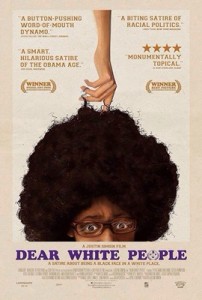By Carol Cooper
Justin Simien’s new movie “Dear White People” (and it’s companion book of the same name) examines the myth of a happy, healed, “post-racial” America. As the writer/director wrote in his Kickstarter proposal to finance his project: “My film is about identity. It’s about the difference between how the mass culture responds to a person because of their race, and who that person understands themselves to truly be; all explored through the microcosm of a success-oriented Ivy League college.”
Released this October, “Dear White People” is smart, and often funny. It dares to talk about institutionalized American racism which the election of a black President was supposed to destroy. But what this slightly retro, Spike Lee-flavored satire is really about is various kinds of self-hatred and the desperate measures insecure people of every race, class, age and gender will sometimes take to make themselves feel better about themselves.
The controversial email invitation to a “blackface” theme party on a predominantly white campus that triggers a mini-riot in the film was copied almost word-for-word from a social media invitation to a “Compton Cookout” which sparked student protests at the University of California at San Diego in February of 2010. Despite being based upon scandalous racial incidents at integrated colleges reported over the past decade in national news outlets, this film will remind older viewers of issues and controversies college kids experienced in the 1970s and ‘80s, when demonstrations of black power, white backlash, and middle class angst were particularly fresh and raw. But what this film makes clear in snappy, politically acute dialogue, is that none of America’s lingering racial wounds have really healed, or even stopped aching. There is still envy and suspicion over interracial dating; intra-group class conflicts; light skin privilege and general social discomfort felt by whites and other ethnicities despite the positive impact of The Cosby Show; Oprah, and President Obama.
Lionel, a gay black teen who feels marginalized by both black and gay students, becomes an interesting catalyst for change in this drama. Both he and the mixed-race host of a provocative radio show called “Dear White People” embody the neither/nor stance of anarchist rebels who want to destroy both racial bias and a corrupt status-quo because they are personally invested in none of it. One of the funniest moments in the movie comes when Samantha, the radio host, has nightmares about becoming Denise Huxtable, the clueless black space cadet on The Cosby Show. “My hair was soooo straight,” she moans to her white lover. “My sweater was soooo big!”
Interestingly, it is this sensitive white boyfriend (a person Sam hides from her more militant friends) who delivers the most important message offered by Director Simien’s compelling film. He reminds Samantha that true change won’t be brought about by political accomodationists, separatists, cautious liberals, or stubborn conservatives. Only the young self-styled anarchists—who by nature can’t conform to any restrictive system, can bring change or dare to be different . And because anarchists like Samantha and Lionel have nothing to lose by defecting from the old order, they might dare to create something completely new and improved.
Its detractors will say that *Dear White People* oversimplifies the very problems it tries to explore. But until all Americans no longer fear and avoid open discussions about the social and psychological damage caused by racial prejudice in this nation, such candid oversimplifications may be as close as we as viewers of popular entertainment can get to the truth.
